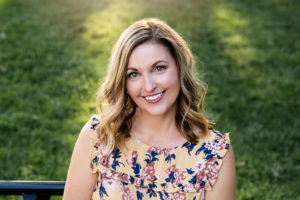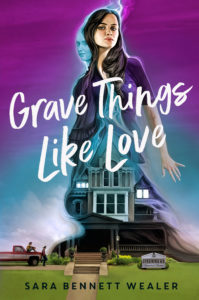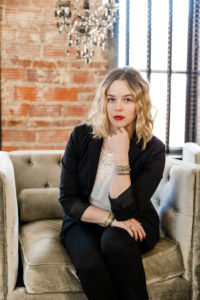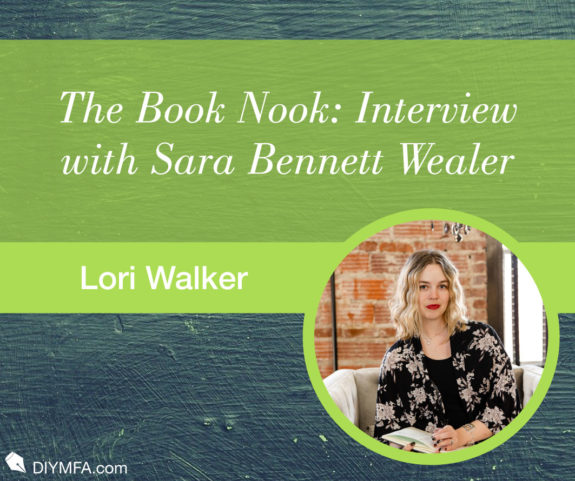Today I had the privilege of interviewing Sara Bennett Wealer, author of the YA romance with a fun supernatural twist, Grave Things Like Love. I was completely drawn to the setting—a funeral home—and loved the coming of age drama and the love story. It was a really fun read and I am so glad Sara was willing to answer my questions about her creative process, other novels, and my request for some reading recs.
I hope you enjoy this interview!
About Sara Bennett Wealer
Sara grew up in Manhattan, Kansas (the “Little Apple”), where she sang in all the choirs and wrote for the high school newspaper. She majored in voice performance at the University of Kansas before deciding she had no business trying to make a career as an opera singer and transferred to journalism school, where no one cares if you can hit a high C or convincingly play a Valkyrie. She went on to become a reporter covering everything from house fires to Hollywood premieres.
These days, she writes event scripts and marketing copy while the sun is out. By night, she writes books for young adults. Sara lives in Cincinnati with her husband, two daughters, two dogs and four cats, and she still sings sometimes when her schedule allows. When Sara is not writing or running around doing Mom Things, you’ll find her at the ballet, or obsessively watching ballet on YouTube, Instagram and TikTok.
You can find her on her website or follow her on Facebook, Twitter, and Instagram.
Grave Things Like Love
Elaine lives in her family-run 1800’s funeral home that she’s set to inherit, so she’s used to being around a dead body or two. Only no one has asked her if she wants to take over the family business. Enter Xander, the new boy in town with a passion for ghost hunting who makes Elaine feel like she’s transforming from Funeral Girl to Fun Girl. But not everyone is thrilled to see her changing, least of all her childhood best friend, Miles. When Xander convinces Elaine to ghost hunt in the funeral home Elaine must face her fears, in more ways than one.
Interview with Sara Bennett Wealer
Lori Walker: First off, I’d love to hear a bit about how you became a writer. What is your journey as an author? What drew you to YA?
Sara Bennett Wealer: My mom was an English teacher, so I grew up watching her read books and the writings of her students. I especially remember Sunday nights watching Masterpiece Theater on PBS. Mom’s specialty was British Lit, so I got the whole Austen/Bronte/Shakespeare immersion at a young age. I don’t remember what prompted me to start writing, only that I felt an urge to do it and filled up notebooks with stories. I won a big award in 4th grade for one of them, which encouraged me even more.
Writing was always something I knew I could do well. So when I decided my first choice of college major—voice performance/opera—wasn’t going to get me a career I could live on, I switched to journalism. I thrived in feature writing, especially when I could write about arts and entertainment. But when I ventured into the working world as a newspaper reporter, I found myself getting assigned municipal beats or transportation, or sitting at the city desk on weekends listening to the police scanner and racing out to house fires. One evening I had a revelation: If I didn’t write something that came from my own creativity—something not assigned by an editor and due at the end of the day about a topic I really cared nothing about—then I was going to have a mental health crisis. I literally stood up from the couch, went to my computer, and started writing my first novel. (It never went anywhere, BTW. It was my training book, and [it was] awful. But writing it saved my sanity.)
The voice that came out of me that night was a teen voice. And I honestly can’t explain why I’m drawn to YA except to say that I find many adult conflicts boring. Young adulthood is filled with choices and obstacles and hope and fear and fun, plus so many opportunities to make mistakes that help build you into the person you’re just starting to become. I love exploring all of that, as opposed to writing about career angst or failed marriages or strained family relationships. (I’m not saying that’s ALL adult fiction is about—obviously! But it’s all I can think of when I think about what I might write in that genre, which probably tells you all you need to know about why I don’t write it!)
LW: What does a typical day of writing look like to you?
SBW: I don’t make my living writing novels—I do marketing, so I sort of mash it all together as I’m able. I get up and get my daughter to school, then come home and spend a couple of hours on whatever work needs to be done for my day job. Most days I do a half-hour weights and HIIT workout at home, then I walk the dogs and get a little lunch.
In the afternoon, I do more day job writing, until it’s time to get my kid from school. Then it’s dinner and spending time with my husband and helping with homework until I’m able to sit down and do some novel work. If I’m drafting, I try to get at least 500 words done a day. If I’m editing, I go until I run out of steam. I decompress watching comfort shows on TV (The Office, Dark on Netflix, whatever new thing is out or new seasons of Only Murders in the Building, Umbrella Academy, House of the Dragon, etc.) or YouTube videos of people cooking or thrifting or whatever other rabbit hole I’ve gone down, before heading to bed. It’s all very exciting!
LW: Your bio says that by day you write event scripts and marketing copy. How do you manage to find the bandwidth to write creatively at night? Any advice on juggling both?
SBW: Being a newspaper reporter was great training for writing on command and on deadline, staying fresh and finding ways to keep going even when you don’t really feel like it. Each day I had a story to write that was due by 5 p.m. I turned it in to an editor who would give me feedback in real time (often with not a lot of regard for my feelings—we had work to get done, and I could cry later at home if I needed to). That kind of work ethic has followed me. I know I can’t wait for inspiration from “the muse.” I can’t wait until I feel like writing. The only way to write a novel is to write it, which means sitting my butt down and doing the work.
Now… how do you do that when you’ve got two kids of varying ages and a day job plus other grown-up worries and responsibilities? My advice is to set a daily word count. I tell myself I can stop after 500 words, and I don’t put any pressure on myself to make those 500 words good. I just need to get them done. And I’ve found something interesting happens… once I start writing, I often can do more. Ideas start flowing. The muscle gets stronger as I exercise it. Even when those 500 words feel like a massive struggle of suckiness, I’ll go back the next day and see that what I’ve written wasn’t half bad. And even if I barely made it through those words, and they did truly suck, well, 500 words builds up if you do it every day, and before you know it you’ve got something you can work with to make better. You can’t improve something that hasn’t been drafted yet!
To help with creative bandwidth, I’ll seek out things that inspire me—books, TV shows, my “rabbit holes” of topics to explore on YouTube. It helps to see what other people are doing, what they’re passionate about, how they tackle creative problems and express themselves.
LW: As I read more and more YA, I realize that at their heart, most YA books are coming of age tales that have elements of different genres pulled in—in the case of Grave Things, romance. And YA appeals to teens and adults alike. Why do you think the coming of age tale resonates with such a wide variety of audiences?
SBW: Like I mentioned earlier, young adulthood is the time when we sort of have permission to try and fail and grow and stretch. I think it’s often more fun and hopeful and engaging to spend time with someone who is evolving and just starting out in life vs. someone who’s seen a lot of it already. YA lets younger readers see that they’re not alone, and I think it helps adults appreciate where they’ve been, while also giving a glimpse of what could still be.
LW: Grave Things Like Love has paranormal romance elements. Your novel Now & When seems to have some sci-fi elements in that she can communicate with the future. And your first two novels, Rush and Rival focus on friend relationships. These are pretty diverse types of stories! What is your process for generating ideas for a new story?
SBW: Most of my story ideas come from situations I’ve been in or relationships I’ve had, or a topic that’s captured my imagination. That’s not to say any of my books are autobiographical; those ideas have more been a jumping-off point to explore all sorts of “what ifs?” And the “what ifs” occasionally lead me to some out-there places. In Now & When, it went in a time-travel-ish direction. In Grave Things Like Love, I wanted an element of fun to balance out what could have been a pretty heavy setting and topic, and in brainstorming a romance, I found a ghost-ish story taking shape. (I say “ish.” because the paranormal and sci-fi in my books are often more like fun elements than the whole story. In general, I see all of my books as contemporary, sometimes with a little extra “something” sprinkled in.)
LW: Fun fact about me, I used to work in a funeral home. So I’ve seen the behind-the-scenes stuff and totally get the desensitized feeling of being around bodies and that guilt over being disappointed when my plans would get derailed while somebody was living the worst day of their life and you did a great job of capturing it. I’m curious what your research was like for this novel. You had to have spent quite a lot of time around a funeral home.
SBW: I got the idea for Grave Things while working one of those newspaper jobs I hated so much. I stumbled upon a family-owned funeral home in one of the communities I covered and thought it would make a great feature story. The family was kind enough to let me spend a good amount of time with them, soaking up the atmosphere, talking about the business, etc. I left town for a different job before I could write the feature, but I kept the idea of a book about a teen growing up in a funeral home setting. I’m glad it rang true for you!
LW: Does writing YA affect your social media strategy in terms of what you post and how you interact with followers? If so, how?
SBW: I know it should, but I can’t bring myself to dive too deeply into creating content for things like TikTok because I think it’s worse to look like an old person trying to be cool for a teen audience. (My 13-year-old has drummed this fear into me by letting me know how cringey any attempts I’ve made so far are.) Basically, I try to be reachable and relatable wherever I DO post. So I’ve invested in a good website, and I post on Instagram and Twitter when I think I’ve got something interesting to show, tell or share. I know I should have a much more robust and well-thought-out social media strategy, but I also know social media only really works when it’s something you enjoy doing, and if I’m just going to look like I’m trying too hard, then I’d rather default to a more minimalistic approach.
LW: A lot of authors are creating playlists to accompany their books, but this being a reading column, I’d like to know what your “reading playlist” is. What books should people read after reading Grave Things Like Love?
SBW: Ooh! Well, if we’re talking about spooky season books, I can tell you I’m dying to read The Cabin at the End of the World by Paul Tremblay. That’s next on my TBR list. Also, anything by Shirley Jackson will get you in the creepy fall mood.
As far as books I love that tell you a little more about my tastes, my all-time favorite is The House of Mirth by Edith Wharton. I highly recommend a book of short stories by Nafissa Thompson-Spires called Heads of the Colored People. And for YA books, I love a good bit of subversive humor. Kill the Boy Band by Goldy Moldavsky and Me and Earl and the Dying Girl by Jesse Andrews fit the bill there. For stories full of heart, I’m loving anything written by David Yoon.
If you decide to check out the book, we hope you’ll do so via this Amazon Affiliate Link where, if you choose to purchase via the link, DIY MFA gets a referral fee at no cost to you. As always, thank you for supporting DIY MFA!

Lori Walker is the Operations Maven at DIY MFA. Though she’s fallen off the wagon as a writer, she’s hoping to return to writing essays (perhaps even a novel!) through her involvement with DIY MFA. She is also Launch Manager, Web Editor, and Podcast Producer for DIY MFA and a Book Coach. She resides in Smalltown, Oklahoma, with her husband and their cat, Joan Didion. You can follow her on Instagram at @LoriTheWriter.







